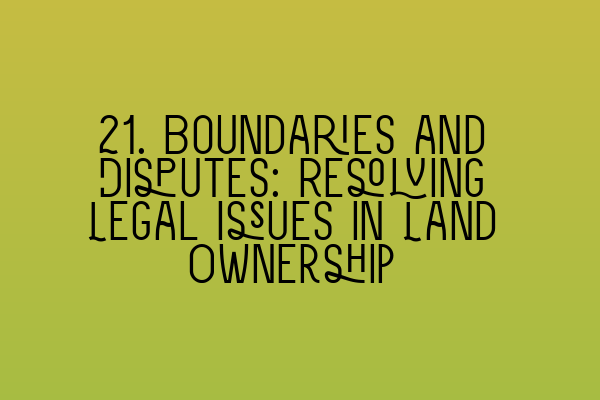Boundaries and Disputes: Resolving Legal Issues in Land Ownership
When it comes to property ownership, one of the most common legal issues that can arise is boundary disputes. These disputes can be complex and emotionally charged, often involving disagreements between neighbors over where one person’s land ends and another person’s land begins. As a property law solicitor at SQE Property Law & Land Law, I have dealt with numerous cases related to boundaries and disputes, and in this blog post, I will provide you with a comprehensive guide on how to navigate these legal issues.
Understanding Boundaries
Boundaries play a crucial role in defining a property owner’s rights. They determine the extent of one’s land and any structures or encroachments upon it. However, boundaries are not always clearly defined and can give rise to disputes. Understanding the concept of boundaries is essential when it comes to resolving legal issues related to land ownership.
Boundaries can be established and recognized in various ways, including:
- Physical Features: Natural features such as rivers, walls, fences, or hedges can act as boundaries between properties. These physical features can be used to determine the extent of one’s land.
- Written Agreements: Landowners may enter into written agreements to establish and clarify boundaries. Deeds and contracts can contain specific language and descriptions that identify the boundaries of a property.
- Boundary Surveys: Professional surveyors can conduct boundary surveys to accurately determine the extent of a property. These surveys involve measuring and mapping the boundaries, providing clear evidence for land ownership.
Resolving Boundary Disputes
Despite efforts to establish clear boundaries, disputes can still arise between neighboring property owners. These disputes can be triggered by various factors, including:
- Encroachments: When one property owner’s structures or improvements extend beyond their land and onto a neighboring property.
- Trespass: Unlawful entry onto another person’s land without permission.
- Misinterpretation: Different interpretations of deeds, contracts, or oral agreements can lead to disagreements over boundaries.
- Adverse Possession: When a person occupies and uses another person’s land in an open, continuous, and exclusive manner for a certain period of time, they may claim legal ownership of the land through adverse possession.
Resolving boundary disputes can be a complex and time-consuming process. As a property law solicitor, I recommend the following steps:
- Communication: Start by discussing the issue with your neighbor in a calm and respectful manner. Often, misunderstandings can be resolved through open dialogue.
- Research: Conduct thorough research to gather evidence supporting your claim. This can include reviewing deeds, historical documents, and conducting surveys.
- Mediation: If direct communication fails, consider engaging in mediation. A neutral third party can facilitate discussions and help find a mutually acceptable resolution.
- Boundary Agreements: In some cases, it may be possible to reach a boundary agreement with your neighbor. This agreement will establish the new boundary line and be legally binding on both parties.
- Litigation: If all attempts at resolution fail, litigation may be necessary. Seeking legal advice from a property law solicitor is crucial in this situation, as they can guide you through the legal process and advocate for your rights in court.
Seeking Professional Assistance
Property law and boundary disputes can be complex, and it is essential to seek professional assistance to ensure the best possible outcome. At SQE Property Law & Land Law, our experienced solicitors specialize in resolving legal issues related to land ownership. Whether you need assistance with boundary disputes, adverse possession claims, or any other property law matter, we are here to help.
Contact us today to schedule a consultation and explore how our solicitors can assist you in resolving your legal issues effectively and efficiently.
Related Articles:
